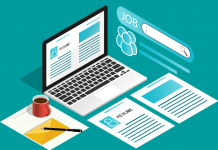So you wanna work in a call center. Or, to put it more accurately, you wanna receive a call center agent's salary. This is the perfect post for you as I've created a compilation of the best call center tips for applicants starting from your job hunting up to your final interview.
And if you do make it to your final interview, I'll also share tips on how you can survive the call center training and nesting. Then finally, sign the job offer. Here are the 7 stages you have to go through before finally becoming a certified call center agent.
1. How and where to apply.
This is the easiest part. All you need to do is join call center job hunting Facebook groups and you'll see hundreds, if not thousands, of job listings every day. Most of them are mass hiring.
In fact, you won't have to worry about getting an interview as headhunters will do it for you.
Headhunters are people who refer applicants to companies in return for referral bonuses. Their bonuses range from 5 up to 20 thousand pesos per applicant who makes it to the contract signing. In some cases, their bonuses depend on the applicant's length of stay in the company.
Be careful though as some headhunters don't mind misinforming applicants just to bag more referrals. When applying through one, always ask about the following info before even agreeing for a meetup/ walk-in:
a. The company's location
Set the location you're willing to go to. Don't apply too far if you aren't willing to commute to that location every night.
b. The basic salary
Most headhunters exaggerate salary figures to attract more applicants. Beware of job posts saying "salary up to (__insert huge amount here___)".
Chances are, you'll end up believing that is what you'll truly get per month only to find out later that the basic salary is only 40% of that said figure.
Most of that figure is made up of attendance and performance bonuses. If you're late for a minute or absent for a day, it's bye-bye 6k pesos. Meanwhile, the rest of the amount is just pure B.S.
Ask about the real the basic salary figure so there won't be any unpleasant surprises.
c. The recruitment process
Ask how many interviews you're gonna go to, if there are any tests like Berlitz, Versant, or mock calls, and grammar tests so you don't go to your interview unarmed. It'll save you time and give you more confidence knowing you're prepared.
2. How to pass your initial interview
Initial interviews are the easiest part of your interview. They're usually brief and generic. The interviewer asks the usual interview questions but she doesn't dive that much deep so there almost aren't any follow-up questions.
At this stage, an interviewer's goal is mainly to asses your English communication skills, accent, and grammar. If you need more help improving your English, I suggest waiting for a week or two before requesting an interview. Use that time to improve your English.
I've written a post on how to improve your English for a call center job interview: How to Improve Your English Accent and Land a Call Center Job
Initial interviews over the phone
Some companies like ePerformax conduct initial interviews over the phone to save time. If the company you're applying in does the same, this post is for you: How to Pass a Call Center Phone Interview.
3. How to pass your online tests
Not all companies conduct tests but when they do, these are the common tests you'll encounter:
- English grammar test
- Technical tests (if you're applying as a TSR or Technical Support Rep)
- Berlitz
- Versant
- Mock call
- Typing test- some accounts require you to be able to type at least 20-25 word per minute. The best technique to improve your typing speed is to take typing courses online. They're free. They'll teach you where to position each of your fingers so you don't have to look at the keyboards when typing. That's the only secret to typing faster.
4. How to ace your final interview
Final interviews are more in-depth and more personal than initial ones. They also take longer to finish and your interviewer will ask a lot of follow-up questions.
She'll also try to trap you if she senses that you're hiding something unpleasant like the reason why you quit your last job.
In this stage, she's not only assessing your English skills but also your working behavior, your past work/ school experience, your personality, and whether you're capable and responsible enough to handle the responsibilities of the job.
For a detailed guide on how to pass your final job interview, check this out: How to Pass Your Call Center Final Job Interview & Get Hired.
5. How to survive the call center training
Being invited for training doesn't mean you're already hired. Not even if you've signed a paper for it. It's only to ensure that you understand the terms and conditions included in the training.
The good thing is, you'll receive your daily allowance so you can allow yourself a little sigh of relief. 🙂 The company wants to make sure that you have no reason to miss any day of your training.
And you should NOT. Miss a day of your training, especially in the product training stage, and you might as well quit. The product training will overload your brain big time. Miss a day and you're lost.
If you're sick or if you have a valid reason to be absent, the company will, of course, take you back in provided that it's only for a day AND as long as you can provide a PROOF that you aren't lying.
And if you're lying, pray that your trainer doesn't have the nose of a cat who can smell fish from a mile away.
Here's a complete guide on how to pass your call center training: How to Survive Your First Call Center Training (For Complete Beginners).
6. How to pass the nesting stage
The nesting stage is when you're gonna start taking actual customers' calls. On the first to third days, you'll start out by listening to live calls between a tenured agent and his/her customers You'll sit with that agent for 3 days.
Around the fourth day, you'll start talking to customers for at least 4 hours a shift. The rest of the 4 hours are spent reviewing what you could learn from the live calls.
It's very important that on your first to third days, you take note and listen attentively to the live calls. You can ask the tenured agent assigned to you from time to time but be mindful of your questions and the frequency you ask them as she's also busy with her tasks.
Here's a complete guide detailing what happens during a call center nesting period: How to Pass Your Call Center Nesting Test.
7. Your first day as a call center agent
Your first day as a call center agent is the day you're expected to meet the call center metrics.
Depending on the account you're working for, you'll need to have a required duration limit for each of your call (usually 5 minutes), a limited length of hold time (usually 2 minutes minimum), and a passing CSAT (Customer Satisfaction) score.
Also, expect the following challenges if you're a complete beginner:
- Language barrier (if you're not used to speaking English daily)
- Knowing when to speed up and when to slow down when explaining things to different customers
- The “what’s the weather there like today?” question
- The time zone
- The "where are you located?” question
I've written a post with tips on how you can address these challenges and get used to them eventually: First Day in the Call Center Floor: What You NEED to Know.
Hope this helps. Questions? Drop them down below and I'll get back to you ASAP.



